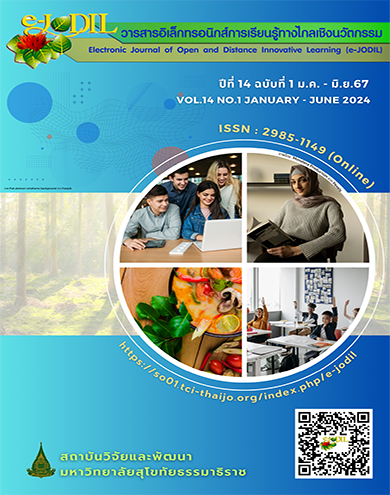Lifelong Learning: An Approach to Sustainable Development Goal in Education and the Role of Higher Education Institutions
Main Article Content
Abstract
Lifelong learning is a self-learning process in human survival adaptation to change from birth to death. It's an important goal of education aiming at developing individual to be a lifelong learner who contributes to changes through approaches to the sustainable development goals. The current major changes are 1) the digital labor market and 2) the full participation in the aging society; which makes elderly individuals still need to learn, develop their professional skills, and continuously practice using technology to increase employment opportunities, leading to income generation. Therefore, higher educational institutions must adapt their roles to become lifelong learning institutions, promoting lifelong learning for everyone comprehensively and equitably. This includes flexible learning options beyond traditional classroom settings to meet the learning needs of individuals at all stages of life and to address evolving demands. It is essential to 1) have the curriculum collaborating with the industry sector and then expand participation across all sectors of society; 2) use quality assurance criteria to ensure confidence in the quality and efficiency of learning 3) make the credibility to increase the chances of securing funding 4) develop personnel to promote lifelong learning institutions and 5) promote the widespread use of technology for education. Learners should be cultivated from basic education with the attributes of lifelong learners; self-directed learning and critical thinking skills that must enable them to make decisions, and solve problems. When entering to higher education and gaining more experiences, readiness to learn, becoming aware of what is essential to them, leading them to active participation in all dimensions of learning. This contributes positively to the flexible learning environment of higher education institutions and fosters quality lifelong learners who can contribute to the sustainable development of the country.
Downloads
Article Details

This work is licensed under a Creative Commons Attribution-NonCommercial-NoDerivatives 4.0 International License.
บทความ ข้อความ ภาพประกอบ ตารางประกอบ ที่ตีพิมพ์ในวารสารเป็นความคิดเห็นและความรับผิดชอบของผู้เขียนแต่เพียงผู้เดียว ไม่เกี่ยวข้องกับมหาวิทยาลัยสุโขทัยธรรมาธิราชแต่อย่างใด
บทความที่เสนอพิจารณาในวารสาร e-JODIL ต้องเป็นบทความที่ไม่เคยส่งไปลงพิมพ์ เผยแพร่ หรืออยู่ระหว่างการพิจารณาของวารสารอื่น
กองบรรณาธิการขอสงวนสิทธิ์ในการพิจารณาและตัดสินการตีพิมพ์บทความในวารสาร
References
Ates, H. & Alsal, K. (2012). The importance of lifelong learning has been increasing. Procedia - Social and Behavioral Sciences, 46, 4092-4096.
Beairsto, B. (2000). What Does It Take To Be A Lifelong Learner?. In B. Beairsto and P. Ruohotie (Eds.), Empowering Teachers as Lifelong Learners: Reconceptualizing, Restructuring and Reculturing Teacher Education for the Information Age. Tampere, Finland: University of Tampere.
Centre for SDG Research and Support: SDG Move, the Faculty of Economics, Thammasat University. (2016). SDG Move: Moving Towards Sustainable Future. Retrieved from https://www.sdgmove.com/sdg-101/
Chancharoen, T. (2019). Learning Management for Thai Education 4.0. Journal of Graduate Studies Valaya Alongkron Rajabhat University. 13(3), 216-229.
Department of Older Persons. (2021). Current Aging Society and Economy in Thailand. Retrieved from https://www.dop.go.th/th/know/15/926
Education Technology Development and Integration Support, King Mongkut’s University of Technology Thonburi. (2021). Role of Micro-Credentials in the Digital Age and Thai Education Today. Retrieved from https://www.ets.kmutt.ac.th/post/digital-transformation-microcredential
Kaplan, A. (2016). Lifelong Learning: Conclusions from A Literature Review. International Online Journal of Primary Education, 5(2), 43-50.
Knapper, C. K., & Cropley, A. (2000). Lifelong Learning in Higher Education. London: Kogan Page.
Knowles, M. S. (1980). The Modern Practice of Adult Education: From Pedagogy to Andragogy. Englewood Cliffs: Prentice Hall/Cambridge.
Maclean, R., & Wilson, D. (2009). International Handbook of Education for the Changing World of Work. New York: Springer.
Office of National Higher Education Science Research and Innovation Policy Council. (2021). Adjust the Way to Study in Thailand: Emphasis on Building Skills for Thailand to Keep Up with the Changing World. Retrieved from https://www.nxpo.or.th/th/9456/
Office of the National Education Commission. (2003). National Education Act B.E. 2542 (1999) And Amendments (Second National Education Act B.E. 2545 (2002). Retrieved from https://www.moe.go.th/
Office of the Non-formal and Informal Education. (2008). Promotion of Non-Formal and Informal Education Act, B.E.2551 (2008). Retrieved from https://www.moe.go.th/
Organization for Economic Co-operation and Development. (2007). Education at a Glance 2007: OECD Indicators. Paris. Retrieved from https://www.oecd.org/education/skills-beyond-school/40701218.pdf
Panich, V. (2012). The Way of Learning for Students in the 21st Century. Bangkok: ThaiSSF.
Pattaragoranan, N. (2014). Concepts and Management Techniques of Adult Learning. Journal of Education Silpakorn University. 12(1, 2), 18-29.
Power, C. N., & Maclean, R. (2013). Lifelong Learning: Meaning, Challenges, and Opportunities. In R. Maclean, S. Jagannathan, & J. Sarvi (Eds.), Skills for Inclusive and Sustainable Growth in Developing Asia-Pacific. Dordrecht: Springer.
UNESCO Institute for Lifelong Learning. (2017). Learning cities and SDGS: A guide for Action. Retrieved from https://unesdoc.unesco.org/ark:/48223/pf0000260442
UNESCO Institute for Lifelong Learning. (2022). Making lifelong learning a reality. Retrieved from https://unesdoc.unesco.org/ark:/48223/pf0000381857
United Nation. (2019). The Sustainable Development Goals Report. Retrieved from https://unstats.un.org/sdgs/report/2019/The-Sustainable-Development-Goals-Report-2019.pdf
United Nation. (2022). The Sustainable Development Goals Report. Retrieved from https://unstats.un.org/sdgs/report/2022/The-Sustainable-Development-Goals-Report-2022.pdf
Vaill, P. B. (1996). Learning as a Way of Being: Strategies for Survival in a World of Permanent White Water. San Francisco, CA: Jossey-Bass.


